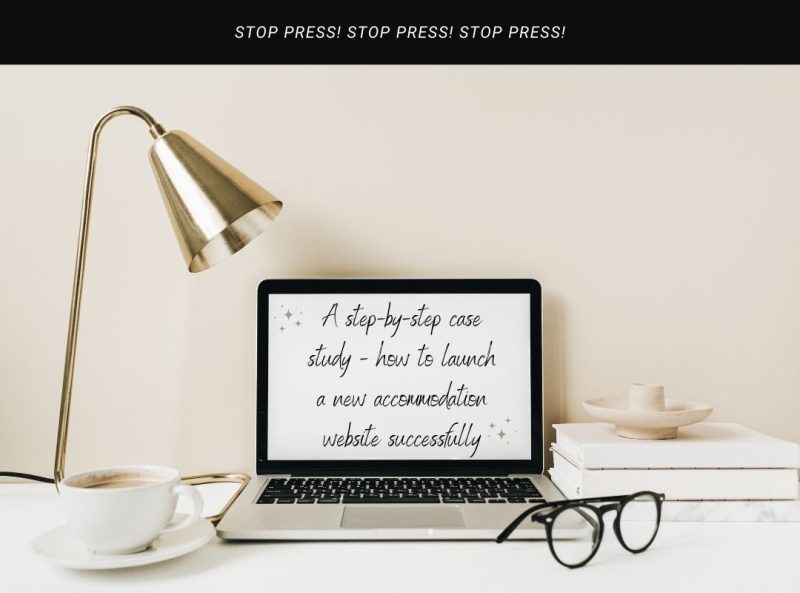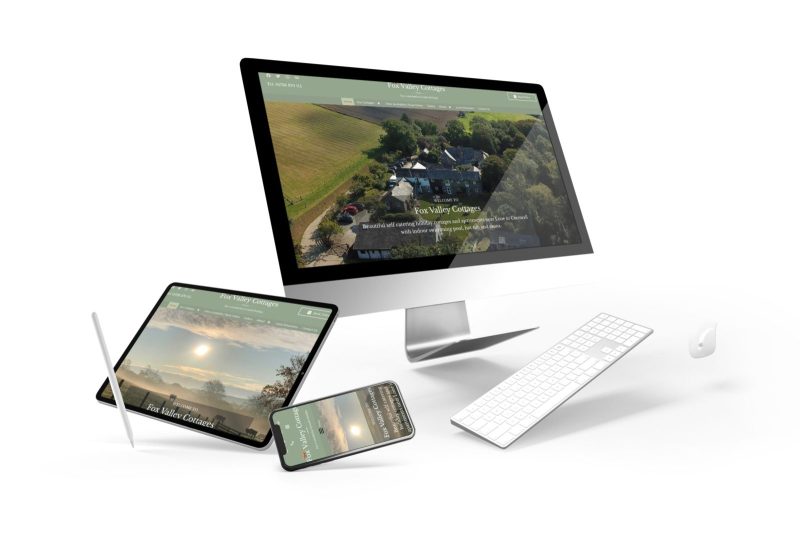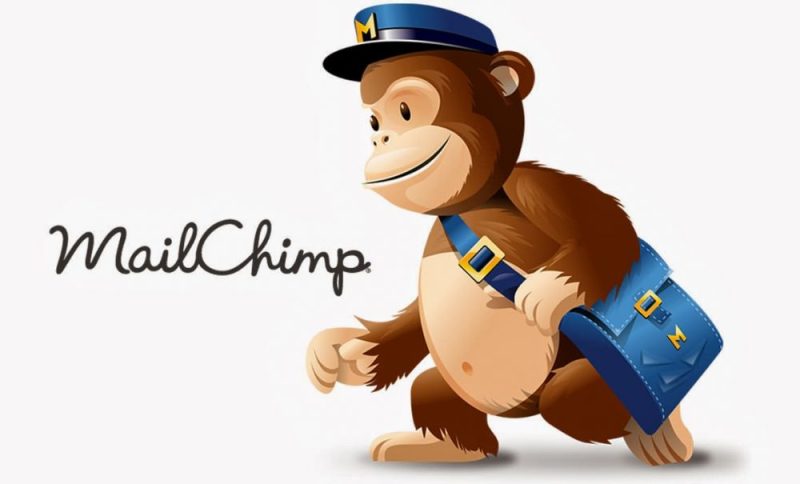
A step-by-step case study – how to launch a new accommodation website successfully
We recently helped a new accommodation owner launch their first-ever website…and decided it would make an ideal case study to help other new owners in a similar position…
In order to get a proper insight of what is involved, we assisted the owner during the whole process, so whilst we not only provided the website, on this occasion we also created all the website text & photography, and provided the owner with professional email service, e-marketing tools (more on this later), the setting up of social accounts and tutored in the use of Instagram & Facebook page, guest feedback forms, e-marketing set up including newsletter sign up website integration, assisting with getting set up on Airbnb, and general hand-holding for the first few weeks of the launch!
This experience gave us a huge insight into what new owners go through to get a site ready for launch, getting started on social media, and setting up all the other marketing tools that are necessary to make the site a success.

Getting Social…
We connected the owner’s new Instagram account with their new Facebook page to allow any Instagram posts to automatically get added to their Facebook page; saving a huge amount of time and effort!
As we had access to this Instagram account we were able to authenticate a connection using Curato.io.

E-marketing – the accommodation owner’s new best friend…
Whilst it’s important to build up a “fan” base on Instagram and Facebook, email marketing is still considered one of the best forms of marketing. Nothing lasts forever, and who knows if Facebook will be around in 5 years’ time? How awful would it be to rely on a huge number of people following you on Facebook to one day have this resource disappear – and if you think it can’t happen, just remember that’s what we all thought about MySpace!
Each of our websites includes the ability to integrate with Mailchimp; (this brilliant service allows you to have up to 2000 contacts (email addresses) in your “audience” free of charge.) You can send multiple emails/newsletters each month to your audience, and this is definitely the year to build up your contact list (a deficit in available accommodation means lots of people will be signing up to owners’ mailing lists to hear about possible cancellations). Once you have a good number of contacts in your audience, if you ever get a late cancellation you can send it out to your email contacts and it’s very likely to get re-booked. Use your email list to prompt early bird bookings for next year by building up interest via a seasonal newsletter. We include a newsletter sign-up form on each of our new websites; you simply need to provide us with an API key found on your Mailchimp dashboard, this connects your site to your Mailchimp account. Once connected, anyone who visits your website and fills in the newsletter sign-up form will get added to your audience, and you will be able to email them offers and news. As it’s a proper e-marketing service, anyone who signs up who no longer wishes to be on the list can easily unsubscribe.
We took this service a step further, and set up an automated welcome email for the owner, so that anyone who signed up via her site was sent an email, welcoming them and asking them to follow her social media. We also added the website logo, so that all newsletters would look professional and start to build up the accommodation’s “brand”.

Social Media
It’s a necessary evil; websites that use social media frequently (and correctly) will find their site will perform better than the site of an owner who doesn’t use it. What should accommodation owners (or any business owner) be doing with social media? As an absolute minimum, we recommend setting up a Facebook business page (you will need your own Facebook account to set one up, but don’t worry, there isn’t any link between your personal profile and your business page). The business page needs to be filled in as fully as possible, including a nice cover photo, profile logo/pic, page description, contact information and very importantly, the website link! The quality of what you post is more important than frequency, and the aim would be to post at least something once a week. If you have lots of great content you can aim to do a few more, perhaps 3 to 4 posts a week.
Instagram is possibly even more popular than Facebook, and you will find nearly every business is using it.
Setting up Facebook and Instagram accounts properly is quite time-consuming to set up fully. We think it’s great that you can now connect your Instagram account to your Facebook page (Instagram is now owned by Facebook) so that you can quickly post to both areas at the same time (via your Instagram account).
TIP: Did you know that if you have a chromebook you can add the Instagram app? Unlike PCs and Macs that don’t allow this, a Chromebook is more akin to an Android phone, and offers apps just like a phone! This makes life a lot easier for people who like to type using a keyboard instead of on a phone for writing social posts!

Airbnb – use the big booking sites to help your own site!
We’ve always known that if an owner’s accommodation is on Airbnb, where it can be viewed by hundreds if not thousands of people weekly, some of these viewers who want to book that property will “google” to find the owner’s website, in the hope of booking directly at a slightly better rate. Using these big booking sites is the fastest way to get seen online, and you will have the potential to get direct bookings via your own website as a result.
Even if the owner shows exactly the same nightly rates on their website as they do on their Airbnb listing, the guest will be better off financially booking directly on the owner’s website as Airbnb adds a hefty fee on top for themselves. In addition to this rather large service fee to the guest, Airbnb also charges a small fee to the owner. But one of the main incentives for owners to get direct bookings is that with Airbnb you don’t receive any funds until the guest arrives at your property. The owner is also more in control with direct bookings – eg any last minute Covid cancellations can be hopefully moved to a different date rather than a full cancellation.
This is where having a great-looking professional site comes into its own. The likelihood of getting direct bookings increases hugely if the owner’s website looks good and is of a high standard. It needs to be obvious that it is updated frequently (eg recent social posts, recent reviews are evidence that the site is up to date). Whereas if the site looks old, and as if it hasn’t been updated for some time, then it is unlikely that direct bookings will occur.
What we hoped would happen is precisely what did happen with the new owner; the site had been live for a couple of weeks before the owner added their listing to Airbnb (this is vitally important, as this allows time for the new site to be “indexed” on Google. Until Google has indexed a new website, Google (and other search engines can’t return the site in any searches even for a search of the property name, as the site is completely unfindable until the site has been crawled by the Google bots, which allows the search engine to understand what the site is about).
Once the owner’s listing on Airbnb was made live, it became really interesting. Within the first week of being live on Airbnb, 4 bookings were taken. The first two bookings were direct via the owner’s website, the 3rd and 4th via Airbnb. A 50:50 split! The owner was delighted.
Update: why direct bookings are best – Airbnb allows guests to cancel who have been told to isolate due to Covid, even as close as the day they are due to arrive and will refund them fully (minus their own admin fee of course!) – leaving the owner high and dry! With direct bookings you will have already received the full amount and then it is within your own control to allow for any refunds or to move the guest to another date.
How to take direct bookings on your website?
Direct bookings via your own website can be done in 2 ways, the best way is to use a booking system, as this will take care of a lot of the administrative work; i.e. the guest can book online via your site, the booking system will take the deposit (if the start date of the holiday is more than X weeks away) and request the balance at the appropriate time, sending the guests automatic emails so the owner doesn’t even need to think about this aspect. View some frequently used booking systems here
The alternative is to use a simple calendar and an enquiry form (We provide these as part of the site set-up if a booking system is not going to be used). This method is ideal for owners who want to vet potential guests (as was the case of the owner we were helping). The owner enjoys being able to correspond with the guests and we made life easier for her by setting up some email templates (eg for sending bank details etc), so that she didn’t need to copy and paste these details for each new booking. There is no right or wrong method, but very much what you feel is best for you.

Timescales: When and what should you be doing?
If you are planning to do this all yourself, these are the timescales/timings you should work to:
Start with…
- Your Website – this is going to take between 2 and 4 weeks to get set up and finished off, and so you want this live as quickly as possible. It can take Google a couple of weeks or longer to index a new site – this is when Google sends its bots to crawl the site pages, and find out what it is about. Until it has done this, Google is not aware your site exists, and so can’t return it in searches. The aim is for your site to be able to get found by the accommodation name, and the town/region. If your property hasn’t got a name, create one! Try and find a name that is not already in use as a holiday let in your town. This is vital as if you plan to use big booking sites (and then get direct bookings via your site as a result) you need to have your property name in use on your listings, to enable people to know what to search for on Google and other search engines. Eg Sea-Renity, Sidmouth – view this Google search – note how Sea-renity’s site comes up first!
- Social media & Mailchimp – whilst you wait for your site to be ready, get started with your social media, setting up Mailchimp, Instagram, Facebook & perhaps Twitter for your accommodation. Try and create some brand consistency, so if you have a nice logo that you are using on the website, use this logo as your profile pics on your social accounts. See Sea-Renity’s Instagram here
- Booking system – whilst the website is being set up, find the right booking system for you. View the most popular ones here It will take a bit of time to set this up so don’t leave this until the last minute! Set up a payment provider too, eg Stripe – this allows your guests to pay via card on your booking system. Paypal is ok too, but Stripe only charges 1.4%, whereas Paypal is 2.9% for each transaction (ie each time someone pays you the payment provider takes a transaction fee).
- Airbnb & Other large booking sites – If you are hoping for direct bookings don’t do this until you are sure your website is indexed, otherwise potential bookers looking for your site won’t be able to find it (no booking sites allow you to put your website address anywhere on your listing). When you are ready to add it, be prepared – It’s going to take a good few hours for you to add your listing on Airbnb. It’s very comprehensive, and you need to ensure you have covered all the bases.
Hand holding – settling the owner in…
New owners often have lots of questions as it’s all so new…when taking on new bookings, setting up booking systems, using social media, even asking about spam emails. It is reassuring to have us to ask these questions to, and allows owners to feel more confident and comfortable to carry on by themselves after the initial launch has passed.
If you are a new owner and want to get a new accommodation launched please get in touch!
Call us on: 01404 642014 today!
